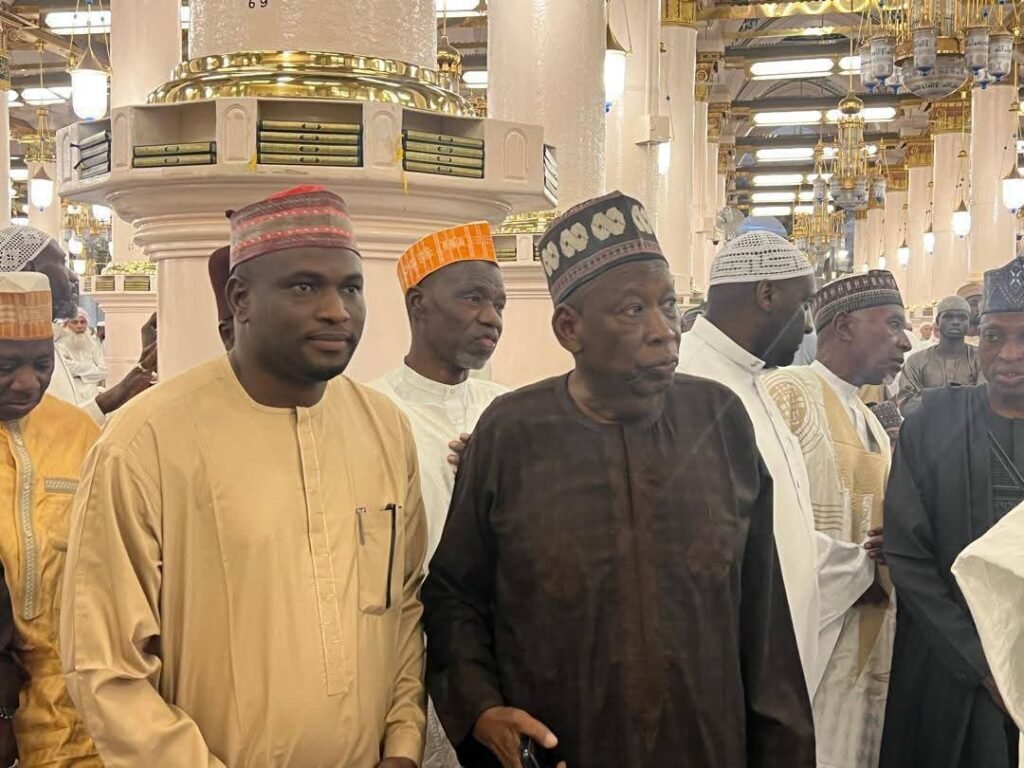IN life, Alhaji Aminu Dantata, the revered billionaire businessman and philanthropist, built bridges – between people, between generations, between wealth and humanity. And in death, his final journey to Baqiyya Cemetery in Madina, Saudi Arabia, has proven just as symbolic.
News Point Nigeria reports that on a solemn Tuesday evenning, under the sacred skies of Madina al-Munawwarah, Dantata was laid to rest in one of Islam’s holiest grounds.
The emotional ceremony brought together not only the spiritual heads and powerful businessmen who shared his philanthropic ideals but also some of Kano’s most bitter political and royal adversaries – Emir Aminu Ado Bayero and Emir Muhammadu Sanusi II; former APC National Chairman Abdullahi Umar Ganduje, and Sanusi Bature Dawakin Tofa, the fiery spokesperson of the Kano State Governor.
In a country where politics often overrides protocol and rivalry stifles reconciliation, this was no ordinary burial. It was an extraordinary gathering of men who just days ago could not be seen together in the same room, let alone the same prayer line.
It is an established fact that the Kano Emirate crisis has split the ancient throne right down the middle. On one side is Emir Muhammadu Sanusi II, reinstated by Governor Abba Kabir Yusuf under the Kano State Emirate Council (Repeal) Law 2024. On the other side, Emir Aminu Ado Bayero, appointed in 2020 and backed by powerful interests including the then-ruling APC in the state.
The rivalry between these two royal houses had grown so tense that both men often avoided public religious or social ceremonies where the other was expected to attend.
Yet, as Janazah prayers were performed in the Prophet’s city for a man who meant so much to Kano and the nation, the two Emirs – united in grief, humbled in prayer. No protocol, no side whispers, no royal guards dividing them. Just silence, reverence, and shared loss.
Perhaps even more surprising was the quiet handshake—brief but telling—between Abdullahi Umar Ganduje and Sanusi Bature Dawakin-Tofa. Their animosity has been one of the most venomous in Kano’s contemporary politics.
The rift between them deepened in early 2024, when Ganduje was suspended by his APC ward over allegations of anti-party activities and non-payment of dues—a move widely believed to be orchestrated by Bature, a native of Dawakin Tofa, Ganduje’s own backyard. The police even summoned Bature over allegations of criminal defamation tied to Ganduje’s suspension, an event that exploded into a legal-political confrontation.
Clad in brown attires, eyes swollen with grief and voices hushed in submission to Allah’s will, both men were seen exchanging subdued greetings before taking their stand inside the Masjid an-Nabawi prayer complex. No press statements, no backroom barbs—just humanity on display, united by death, and perhaps, by the legacy of a man who stood above politics.
Alhaji Aminu Dantata, aged 94, wasn’t just a business mogul. He was a moral compass, a father figure to many, and a benefactor to thousands who will never know him personally.
His influence cut across regions, religions, and classes. From funding hospitals and schools to sponsoring Hajj pilgrims, to supporting humanitarian efforts both publicly and anonymously, Dantata represented the highest ideals of wealth in service to God and people.
And perhaps, it is only fitting that his final act—even in death—was to bring Kano back to some level of moral clarity. His burial proved that, when stripped of ambition and pride, leaders can still come together for a greater cause.
This moment of peace, however, came against the backdrop of an ongoing legal drama. Just weeks before the burial, the Court of Appeal in Abuja restrained the enforcement of its own judgment upholding the repeal of the 2019 Emirate Law.
The judicial pendulum has swung wildly in recent weeks—most notably when a Federal High Court in Kano nullified Governor Yusuf’s actions under the new 2024 law, only for that ruling to be set aside by the Court of Appeal for lack of jurisdiction.
Meanwhile, the fate of Emir Sanusi II’s reappointment—and Emir Ado Bayero’s dethronement—hangs in a legal limbo, awaiting the Supreme Court’s final interpretation. Still, for a few hours in Madina, none of this mattered.
Whether this Madina moment will lead to lasting reconciliation is yet to be seen. Political battles and legal disputes will resume, no doubt. But Alhaji Aminu Dantata’s burial served as a powerful reminder of what is possible when ego yields to eternity.
In the hush of Baqiyya Cemetery, where some of Islam’s most revered companions are buried, Dantata now rests. And in his resting, he taught Kano—and perhaps all of Nigeria—a final lesson: we are all temporary. What remains is not our throne, nor our office—but our character and contribution to humanity.
In the words of a Kano Indigene, Bashir Ibrahim who witnessed the burial: “If Aminu Dantata could bring them together in death, maybe his legacy can teach us how to live better in peace.”








